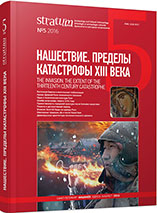Восточная Европа и монгольская глобализация
Eastern Europe and Mongolian Globalization
Author(s): Nikolay Nikolaevich KradinSubject(s): History, Cultural history, Historical Geography, Middle Ages, 13th to 14th Centuries
Published by: Издательский дом Stratum, Университет «Высшая антропологическая школа»
Keywords: Mongol Empire; Old Rus; Europe; 13th—14th centuries; globalization; nomads; cultural connections
Summary/Abstract: When evaluating the role of the empire ruled by Genghis Khan and his successors in world history, one should not overlook the fact that the Mongol conquests brought death and destruction to many peoples and civilizations. However, at the same time, it would be incorrect to exaggerate the degree and character of the devastation perpetrated by the Mongols. As a result, stable and wide-reaching networks of cultural and technological contact between diverse peoples and states. This became the foundation of fruitful technological and cultural exchange, and facilitated the implementation of new possibilities and unique discoveries, which were fated to radically change the world in a few centuries’ time. The most important positive effect that the Mongol Empire had on world history was forging a single, unified system of land and sea routes used for international trade. This phenomenon could boldly be termed the medieval, or Mongol globalization of the 13th and 14th centuries.
Journal: Stratum plus. Археология и культурная антропология
- Issue Year: 2016
- Issue No: 5
- Page Range: 17-25
- Page Count: 9
- Language: Russian
- Content File-PDF

